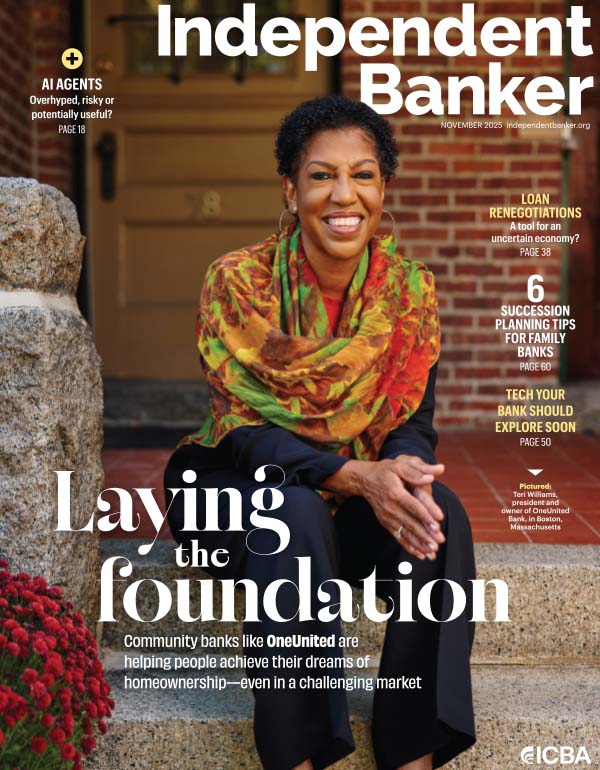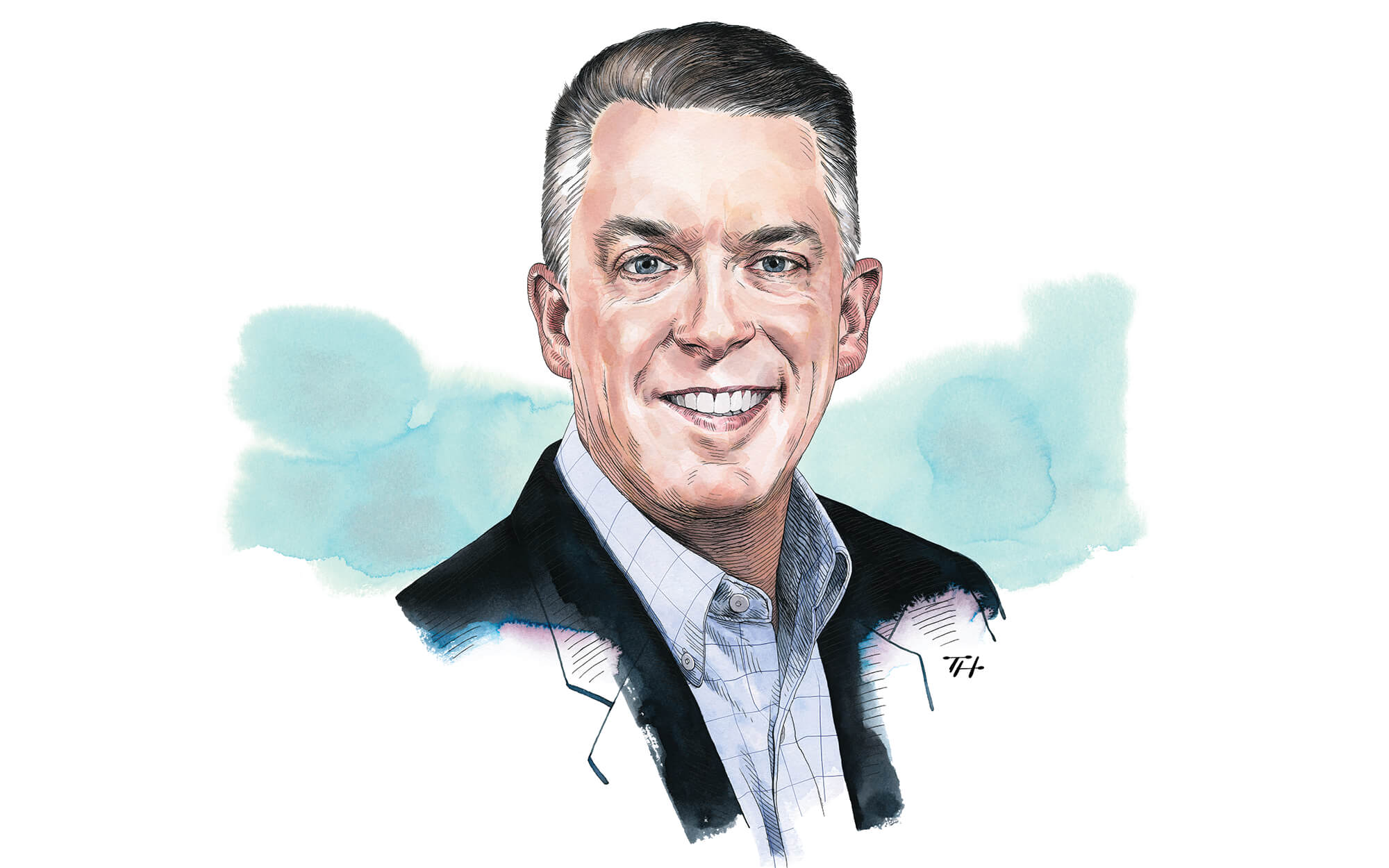What do you do when the 2021/22 ICBA executive committee has more to say than can fit in the April cover feature? Give them some more real estate online. Read on to see what new chairman Bob Fisher and the rest of the current ICBA leadership bankers have to say.

What are the top one or two things you want to achieve this year as part of the executive committee?
Bob Fisher: My number one priority for 2021 is to get more community bankers engaged with ICBA and grassroots advocacy. With a new administration and new heads of some of the regulatory agencies, it is more critical than ever to be engaged and advocate on behalf of the community banking industry. My second priority is to help our industry embrace innovation. Banking, and the world, for that matter, are evolving continuously and quickly, and community bankers need to keep up our game. One such solution is collaborating with fintech firms that can develop the solutions that our customers are demanding. The ICBA ThinkTECH Accelerator provides an amazing opportunity that brings community banks and fintechs together to create new innovative solutions.
Brad Bolton: I want to be accessible, responsive and accountable to ICBA members and work to continue bringing value to their organization and employees through our three cornerstones of advocacy, education and innovation. I also want to play an active role on social media telling the community banking story to followers, regulators, media and, most importantly, policymakers and Congress, because our story matters to the communities we serve!

Russell Laffitte: As a new member of the executive committee, I am looking forward to engaging with my peers and contributing to their efforts to share the important messages behind ICBA advocacy, as well as providing community bank-focused products, services and education programs. I also look forward to being a part of the change that will take place in the organization as we move forward in a post-pandemic environment, continuing to advance to serve our constituents: community banks.
Greg Deckard: I want to continue to help tell the tremendous story of the role that community banks play in our country, especially the way in which we responded to this pandemic crisis. Our industry was the primary conduit in providing relief to our small businesses and farmers in our communities with the SBA Paycheck Protection Program. Now, more than ever, I believe people understand the difference between community banks that went above and beyond to assist versus the other financial institutions that do not understand our relationship-based model. ICBA is the “party” of community banks and has built a reputation for advocating for our industry, regardless of the political party in control. We need to continue to grow our grassroots advocacy among all community bankers, let our voices be heard and support our ICBPAC to get our message heard. The tremendous participation of new bankers in our recent ICBA Connect is one example of the great opportunities we have to enhance our messaging.
Tim Aiken: As a new member of the executive committee, I look forward to supporting this team to advocate for our industry. I want to do my part to contribute to the continued success of our association, which has done so much for me and my bank. I have been a long-time supporter of ICBA and my state association and pledge to continue to participate and effect positive change to the best of my ability.
Noah Wilcox: I want to continue to engage our membership, reaching deeper into the banks in an effort to broaden and strengthen our grassroots voice. I also want to continue to fight hard for a level playing field for our members. And, as always, I look forward to advocating tirelessly for our industry.

Preston Kennedy: More than anything, I want to resume face-to-face outreach to community bankers throughout the country. While virtual meetings have great value, and we have been able to engage more community bankers, nothing beats the connection that starts with a warm handshake.
Tim Zimmerman: Clearly a top priority will be to establish a very strong working relationship with the Biden administration. Another one is to ensure that the issues most important to our membership are communicated and discussed with the appropriate leaders in Congress and at the regulatory agencies.
Jack Hartings: After this past year, I want ICBA to focus on what we can do to help our community banks thrive in the post-pandemic world. As we move out from under the pandemic, many things will have to change, while it will also be great to get back to “normal.” I am confident that ICBA will leave no stone unturned and do what we can to move our industry forward.

In your own advocacy efforts, which story was most effective in winning the support of a legislator?
Fisher: Advocacy works best when you share a story with details of how legislation affects customers. Legislators have many constituents, and it’s our job to help them understand the impact that legislation has on your bank and your bank’s customers. Connecting the issues to their constituents is key. During the first round of PPP, I was in close contact with my congressman via email, phone calls and Zoom calls. He appreciated the information being shared and the difficulties we faced with the PPP program. He truly wanted to be part of the solution and to help the customers in his district. One of our largest PPP loans to a nonprofit would not have happened had it not been for the research and assistance from our congressman and the SBA to determine eligibility. As a result, we were able to fund the loan and help prevent a major layoff, therein helping them continue to provide services to those in need in our community.
Bolton: When we advocate, it is always best to give a real-life story of how regulations affect a citizen that legislator represents. During our PPP advocacy efforts, [they paid close attention when we had] real testimonials ready on the EIDL advance issue or what simplified forgiveness would mean to the legislator’s constituency. This should serve as our model going forward: Tell more real-life stories to gain the most attention.

Laffitte: It is so important to go into the meetings with your congressional member with a story on how an issue affects their constituents. These stories bring it home to them. It helps them understand how and why their support or non-support of an issue affects their constituents, who put them in office.
Deckard: Being able to show the significant amount of consumer compliance and paperwork involved in a simple conventional mortgage loan to our legislators during a visit in our home district was helpful in communicating the tremendous regulatory burden facing community banks in just one product, especially when the consumer did not benefit from the regulatory changes and more confusion was created. I think showing the burden and telling our story of the challenges made an impact.
Aiken: In August 2019, we hosted our first in-bank visit with a legislator, when we hosted Rep. David McKinley [R–W.Va.]. Our executive management team attended, along with a couple board members. Rep. McKinley was very generous with his time, he listened, and he asked many good questions and for more information on some of the issues we discussed. His staff also sent some follow-up questions to us. Most importantly, he affirmatively gave his support for some of ICBA’s key issues. I learned how important it is to foster those relationships with your members both while in Washington, D.C., and, more importantly, at home.
Wilcox: Anytime I am lobbying members, I find it important and effective to humanize the story to the member’s state or district and give them tangible real-world examples of how it helps their constituents. I don’t focus on the bank, but the outcome.
Kennedy: The best examples are the ones that hit closest to home. Legislators have a vested interest in being seen as “of the people.”
Zimmerman: There are too many stories to single out just one. Winning support is the result of a focused effort, but it is also as simple as honestly and genuinely explaining to the legislators and regulators the real impact of what they have done or are planning to do. In many cases, once they hear the “real world” impact of their actions, they are receptive to our request of action.
Hartings: I am not sure I can say it was one story, but it was telling my story on how the issues we were dealing with at the time affected or prevented my bank from helping out our customers. I have seen over the years how legislation or regulation eventually was crafted, changed or carved out because the congressman or regulators listened to our stories. I would like to think that I had a small part in shaping a positive outcome by telling my story.

How has your own advocacy work changed during the pandemic, given that in-person visits are discouraged?
Fisher: The biggest change has been the lack of face-to-face meetings. I have continued to email and call legislators and staff to keep them advised of our priorities. My congressman has been very proactive during the pandemic. He has organized Zoom meetings and calls to discuss PPP with all the banks in his district. Having relationships with my legislators and their staff prior to the pandemic has provided the ability to remain connected via Zoom, email and calls. I have found them to be very responsive to my calls.
Bolton: I am thankful that my two member state associations, the Mississippi Bankers and the Alabama Bankers, and of course ICBA … kept their focus on face-to-face meetings with those policymakers even in a virtual form. Virtual visits have been pivotal in continuing to have face time with our delegation to inform them of what was happening in their state and districts. We must never relent from making our voices heard in whatever form we can achieve the one-on-one interaction. Tweeting, texting, emailing members of Congress and their staff is always an effective manner in addition to those opportunities for one-on-one interaction.

Laffitte: It has been much harder to get face-to-face meetings with congressional staff in the pandemic, but there are still opportunities to connect. I have found that it has been more effective to email or call their staff about issues of concern. Running for office is expensive, and during the recent election year, it was also a great opportunity to contribute to ICBPAC.
Deckard: As a result of the restrictions from COVID-19 protocols, I have relied on more frequent calls with our legislators and especially their staff. Participating in their roundtable events, local Zoom meetings with small businesses and representatives, and collaboration on the PPP program issues required a determination for greater communication to respond to the frequent modifications.
Aiken: More emails! I also have attended a few virtual “town halls.”
Wilcox: Advocacy work during the pandemic has really required creativity, patience and a lot more persistence than usual. Advocacy in general terms is best achieved person-to-person, so adapting to the virtual world has its challenges, but I am finding Zoom and social media to be the most effective ways to continue my advocacy journey.

Kennedy: In addition to much more written communication, I have put more effort into communicating through social media, Twitter especially. These messages are definitely seen in the members’ offices.
Zimmerman: Advocacy during the pandemic has been more emails and phone calls rather than visits to local legislative offices or meeting with regulators at their offices in Washington. It is all much easier if you have an established relationship that can be used with different communication vehicles. It is just being creative and finding the best way to get the message across.
Hartings: It’s certainly difficult to passionately advocate when you can’t meet with your congressman face-to-face. Many times, we are dealing directly with the congressional staff, and when you get staff turnover, it is very difficult to build a relationship over emails. I am fortunate that many of my relationships have been built over years, and now when I do reach out, I can usually get the one-on-one conversation with the staff or the congressman. I also use ICBA grassroots outreach; the email letters to our congressmen add up, and I always try to personalize them when I can.

How has your own bank changed since the pandemic started?
Fisher: Due to the pandemic, we closed our lobbies and transitioned to an appointment-only system in the offices. We reopened the lobbies in early June and remained open until just prior to Thanksgiving. We saw a major surge in COVID-19 cases in our area at that time and therefore went back to the appointment-only system in our offices. We have also physically separated departments so that an outbreak would not affect an entire area of the bank. Roughly, 15% of our staff are also working remotely. Additionally, we have really focused on supporting local businesses. Although we have always emphasized “going local,” the pandemic has exacerbated the need to support our local businesses and our communities. As such, we have partnered with local businesses to help promote their businesses, even with a virtual beer tasting with a brewery customer. We also regularly purchase gift cards from local businesses as rewards, anniversary gifts and gifts for our staff. If anything, the pandemic has only affirmed the need to support our local small businesses.
Bolton: Digital delivery of services has increased significantly. Thankfully, with the support of our board, our management team had positioned us well with deposit-taking ATMs, P2P systems, mobile banking, mobile check deposit and e-signature for both deposits and loans. All those services saw great increases in usage. Customers want to bank on their time and, most of the time, on their phone, and the pandemic created a greater demand for that. One thing has not changed, and that is our commitment to being accessible in meeting our customers’ needs. I believe a digital delivery will continue to increase, but one-on-one discussions between community banker and customer will always be a part of our model.
Laffitte: We have been developing a digital strategy while trying to maintain our sense of community and purpose. It is really different to have all of our lobbies closed and not having our customers drop in like before, but we are all having to adjust. Community banking is about relationships and the people. You just have to make a concerted effort to maintain that customer connection, but if anyone is up to that challenge, it’s community bankers.
Deckard: The team at State Bank Northwest truly responded to this crisis in amazing ways. The support of our staff with COVID protocols allowed us to keep our branches open and operate as close to business as usual as possible. We tell the story of how our bank (founded in 1902) never closed a single day during the Great Depression and thus far have been fortunate to keep that streak alive during COVID-19 as well! The passion with which our team members rallied and worked tirelessly on the PPP program makes me extremely proud. Every person in the bank continues to play a role in the program, in which we have provided aggregate PPP loans about four times our capital in the bank. Customers and previous non-customers have been so appreciative of our ability to meet their needs during this difficult time, and our team is proud to have been in a position to assist. Overall, I think we have risen to the challenges and it has made us stronger as a team and created an even more strong bond with our community.

Aiken: We are now using e-sign technology for certain loans. We have decided to keep one of our branches as drive-thru only, permanently closing the lobby. We will be assessing certain job functions that may be done remotely even after the pandemic. We have discovered that not every meeting has to be in-person.
Wilcox: Our bank has realized how much more efficient we can be by streamlining workflow while still serving our customers. We have also realized how much we miss seeing our customers in person. Our lobbies are open by appointment, but there is little demand, as we are able to deliver almost everything digitally.
Kennedy: We have learned to maximize in-person, in-office experiences, and we have learned effective methods of personalizing remote experiences. We have been able to advance our time-honored culture that balances the needs of our customers, shareholders, employees and community through digital resources.
Zimmerman: After the pandemic hit, our bank completely changed how we managed, interacted, communicated and where we worked in just two weeks. Our senior management group and our back-office staff have worked remotely for almost a year now. We implemented rotating “Clean Teams” for the safety of our staff and to ensure continuity of service to our customers. Flexible work schedules, masks, thermometers and ongoing adjustments to meet CDC guidelines are part of our daily routine.
Hartings: We now have more limited lobby hours, but we’re still open. Where in the past we had face-to-face meetings, they are all now Zoom, and it is amazing how much paper we have eliminated by moving online to do most of our tasks. Probably the biggest change with our customers is how we communicate; we now use text communications versus phone calls. We have a lot more bank-owned devices (iPhones, iPads, etc.) to do the job. We currently have a hybrid model for account opening and loan closings. We do what we can digitally, but we still require a lot of wet signatures and paper. We are working on transitioning to e-docs and e-signatures, but we still have a way to go there. I have been very proud of our staff adapting to all the changes.
Tell us about your bank’s innovation strategy and how you would encourage other banks to continue to evolve as technology continues to be a driving force in helping our customers.
Fisher: Innovation is so critical to community banking, and partnering with innovative fintechs is a great option. I have been fortunate to participate in the ThinkTECH Accelerator. I visited Little Rock last year and served on the selection committee for ThinkTECH this year. There are many companies looking to partner with community banks and help us continue to improve our innovation and delivery to our customers.
Bolton: Our management team is committed to meeting customers where they are, most of which is through smartphone or convenience-driven technologies. We are currently evaluating new core software providers, and our driving force is to make it easier for our customers to do business with us and to allow us to become more efficient and flexible in doing so. We are always searching for better ways of creating a digital footprint that allows us to be the bank of choice, continually moving the bar higher to meet and exceed customer expectations. My encouragement to other banks is if you offer technology and innovation solutions, your customers will use it! We have been amazed at the penetration and usage that continues to grow month over month, year over year that reinforces that every dollar spent on innovation solutions is returned in customer usage and making that customer more loyal [to] us.
Laffitte: Our bank is always looking at what we can do to better serve our customers, whether it is remote deposit capture or any other new technology. We do not want to be on the bleeding edge of new technology, but we also do not want to be the last to adopt. We look at what our core processor and fintech company offer in new technology solutions … to choose what is best for the bank and our customers. We really want to allow our customers to choose how we can serve them, whether it is digital or in person. However, being a community bank focused on relationships, we still like in-person the best.
Deckard: Being a relatively smaller community bank with about $150 million in assets (pre-PPP), we have certainly relied on our relationships with third-party service providers over the years. That reliance will continue in the future, with partnerships with fintech providers to stay current with innovation. The ICBA ThinkTECH Accelerator program has been successful in working together with fintech companies to meet the changing needs of customers, and I certainly encourage community banks to get involved and educated on the evolving technological advances in financial services offerings.
Aiken: We definitely keep our eye on it. We are constantly evaluating the need to bring in new technology or enhance what we are currently offering. These items are discussed at every IT Steering Committee meeting. I encourage other banks to stay informed, and there are two great ways to do this: 1) Attend an ICBA convention and the technology forum, and 2) network with your peers.
Wilcox: We have long sought to embrace innovation as a way to ease pain points, improve customer experiences and create efficiencies. Bankers will have to be open to new ways of doing old things in order to continue to satisfy changing customer engagement and delivery channel preferences.
Kennedy: Our bank embraced digital platforms early on, but we continuously work to improve our delivery systems. There are obstacles that have to be met, but community banks have thrived and evolved for nearly 200 years and continue to be relevant to the demands of today’s small businesses and consumers.
Zimmerman: Our bank uses a customer driven approach. We understand that customers want ease of access and simple, straightforward technology along with our very personal service. We always try to maintain that balance as we implement new technologies.
Hartings: We want to do everything we can to improve the customer experience, while keeping our efficient operating platform in place. The pandemic helped us focus in on areas we could quickly improve and also highlighted some of
our weaknesses. We have participated in ICBA’s ThinkTECH initiative to help us explore new solutions and understand what may be on the digital banking horizon. We have also leveraged our current technology partners, moving forward products or
enhancements to better meet our customers’ needs. I have found over the years that real change takes two to three years to implement. I would say our bank is still in the first half of real change, but the pace is accelerating.
How did you get started with ICBA and why?
Fisher: My journey with ICBA started with my first convention in Hawaii in 1976, when I was eight years old. Fast forward to around 2010 or 2011 when I was going through the chairs of our state association, IBANYS, and I was elected to serve on the Federal Delegate Board of ICBA. I had attended ICBA conventions prior to that, but that was when I became engaged and active in ICBA. Sal Marranca, who I knew from different IBANYS events, was going through the chairs of ICBA and encouraged me to get active in ICBA. I love the friendships and connections that I have made over the years through ICBA. It has certainly made me a better banker.
Bolton: I went to several ICBA conventions with my father and family as a bank “kid.” I attended my first convention as an adult in 2011. I left that convention energized and electrified by the community banking message. Later that year, I reached out [for] some literature and statistics on the importance of community banks having their own unique voice. I used that information to advocate for the unique community bank voice in my own state. Time and time again, we see how important that unique voice is. I continue to be involved and advocate, because with ICBA, there is no sitting out issues; there is no double-talk. ICBA is solely dedicated with one mission and that is community banks. I am honored and proud to join my fellow community bankers across the country in advocating for community bank success! ICBA has and continues to give back to me in experiences, education and networking more than I have ever put in.
Laffitte: I am very fortunate to work for a family bank. My father, the longtime chairman and CEO, was involved with ICBA and its committees. He had me start going to ICBA events early in my career and showed me why it was important to be involved.
Deckard: See my answer about how I got involved in grassroots advocacy [in part 1].
Aiken: I first became involved in our state ICBA-affiliated association, Community Bankers of West Virginia. My big issue was (and still is) tax-exempt credit unions that serve the same market that my bank does. While serving as chair of CBWV, I attended my first Capital Summit in 2007. Not long after, I was invited to serve on an ICBA subcommittee.
Wilcox: I got started by being elected as a state director. As a fourth-generation community banker, I feel a deep sense of obligation to support and give back to the industry that has been a part of our family’s history for more than a century.
Kennedy: I had an investment portfolio dropped in my lap, with no experience aside from a banking school class. ICBA Securities gave me a crash course in portfolio management that not only equipped me with basic knowledge but also showed me the cooperative nature of our member-driven association. When I needed help in confronting my own congressman, ICBA provided knowledge, resources and encouragement for my grassroots advocacy effort.
Zimmerman: Our bank was a member of another trade association but joined ICBA after learning about ICBA’s unique role for community banks by our ICBA Member Relations Officer. We eventually changed our membership and never looked back. We realized that ICBA was the only true and effective voice for community banks and a perfect fit for our bank.
Hartings: My bank has been a member of ICBA for more than 60 years, but my involvement was somewhat by chance. I was active in our state association (CBAO) and was the chairman in 2001. I think it was 2004 when an ICBA state directorship
(now the Federal Delegate Board) opened up because the banker serving had gone to work for an out-of-state bank. I ran for the open position and won. I would like to say it was always in my grand plan to get involved with ICBA, but in reality I always
had a passion for serving our industry and was fortunate to get into a leadership position at ICBA. I have been so honored to be given the opportunity.
What value does ICBA bring to the community banking industry and community bank professionals?
Fisher: ICBA provides advocacy, innovation and education. But, from a personal perspective, ICBA is committed to fighting for community banks and only community banks. Our mission is very clear: to create and promote an environment where community banks flourish. We know who we are and who we represent. All of which is critical for effective advocacy. ICBA has introduced me to amazing bankers from around the country. We all face similar challenges, and having relationships with other bankers and their ideas and solutions has helped our bank dramatically. Our collective intelligence is outstanding.
Bolton: First and foremost, it is the advocacy. All ICBA’s values are important, but my cost of membership is justified by the advocacy our excellent ICBA team performs daily for the community banking industry. Second is the education. I am a firm believer in educating our staff, and no one does it better than ICBA’s Community Banker University. Finally, this past year taught us the importance of innovation, and companies that have gone through the ICBA ThinkTECH Accelerator have been pivotal in helping meet customer demands and expectations during the pandemic. I am passionate about ICBA and the work it does for community banks nationwide, because no other organization is solely devoted to our causes!
Laffitte: ICBA is different because it only is focused on the needs of community banks. They are always on the front lines advocating for community bank concerns. They help keep us informed with what is going on through mailers, emails, social media or NewsWatch Today. They also provide an avenue for training our staffs and directors through online courses, videos and seminars. Now ICBA is helping shape the future of community banking by encouraging fintech companies to focus their products on community banks through the ThinkTECH program in partnership with The Venture Center in Arkansas. ICBA is instrumental in the assistance of many products and services such as ICBA Bancard, ICBA Securities and many others that make our jobs to run community banks easier.
Deckard: Some banks would say that it is difficult to quantify the value of involvement with industry trade associations. I do not believe that is the case with ICBA. First, I can determine the return on investment through our active participation in ICBA educational offerings, ICBA Bancard, TCM Bank, ICBA Securities and the many other products and services ICBA provides. A few years ago, ICBA ran a study on the ROA and ROE of the industry, community banks, ICBA members and ICBA members that participate in one or more Services Network providers. The results were clear in the metrics that ICBA member banks and members utilizing ICBA’s products and services were higher performing within our industry. Second, the relationships developed with fellow bankers through active involvement in ICBA have yielded numerous returns to my bank, as we all collaborate on the various issues. The latest example, as noted by our new chairman, Bob Fisher, was the tremendous communication and sharing of best practices as we rolled out the PPP program procedures, policies and use of technology. I know we had a significant competitive advantage as a result of community bankers helping each other! Lastly, the interaction with state and federal regulators, legislators on both sides of the aisle on Capitol Hill, state and federal agencies, and ICBA vendors have provided great value in our franchise. While more difficult to quantify, being actively involved with the stakeholders in our industry has helped my bank stay informed, competitive and connected—resulting in building our franchise value.
Aiken: ICBA has one sole mission, so you always know where they stand and that their advocacy efforts will align with yours as a community banker. On a professional level, the ICBA bankers I have met from around the country over the years are simply some of the finest people I have met, anywhere, in any profession.
Wilcox: ICBA brings our collective voice to life every single day in the nation’s capital while we serve customers on America’s Main Streets from coast to coast. ICBA also keeps our industry involved and provides for continual education opportunities. In short, they help keep our industry vibrant, relevant and competitive.
Kennedy: ICBA has one mission: community banks. One hundred percent of its resources are expended on creating and promoting an environment where community banks flourish. We have no other agenda; we have no other constituents. There are no conflicts in our message.
Zimmerman: That is a hard question, because there are so many examples of how ICBA provides leadership and benefits to its members through a combination of advocacy, innovation and education. ICBA’s work with the Treasury Department, Congress and the SBA resulted in meaningful changes and improvements to the PPP loan program.
Hartings: Advocacy has always been a critical and successful part of our association, but ICBA is so much more. ICBA makes us all better community banks and bankers. I have seen this with my involvement in ICBA. I noticed this very clearly after I completed my journey through the chairs and was able to spend more time back at the bank. The education, the relationships and the knowledge I gained through ICBA allowed me to share those experiences and knowledge to help us make decisions that were very beneficial to my bank. ICBA truly makes all who participate in its programs and services better community bankers. We accomplish this because of our singular goal to serve only one industry: community banking. That has allowed ICBA to deliver first-class focused advocacy, education, services and now fintech solutions for community banks. If you want to be a better community banker, you need to be engaged with ICBA.
Learn how you can help ICBA’s advocacy efforts »






